Land can be seen as a farmer’s most precious resource, and access to land has been identified as a basic right. Ensuring these rights is particularly difficult at a time of climate, food, or economic crisis. What specific issues should be taken into account? Network colleagues shared some of their opinions.
Munkhbolor Gungaa: “Joining hands is vital”
Climate change is having a severe impact in Mongolia: pasture lands seem to have shrunk, and many water sources have disappeared, seriously affecting the traditional lifestyles of the country’s nomads or “malchid”. Their traditional way of life is being equally threatened by mining, particularly in the South Gobi region, and drastic changes are also being presented by some as part of the solution (see article on page 18).
Should pastoralists leave this region and look for opportunities elsewhere? Or should they fight for their rights? Munkhbolor Gungaa is the director of Tsagaan Myandar, an NGO which supports Mongolian pastoralists in their efforts to protect their culture and livelihoods while improving their access to resources. She thinks that the first step is for pastoralists to agree among themselves, and the second is to join forces with others.
Pastoralist leaders have been encouraged to attend meetings and events (such as the Global Gathering of Women Pastoralists that took place in India) and to join international efforts such as the World Alliance of Mobile Indigenous Peoples. “This exposure is helping them see that solutions are easier to find when there is commitment and concerted efforts”. Deciding what to do can be easier as part of a platform. “Joining hands is vital, and external support also helps”.
Fakeye Oluwaseun: “We need to continue being extra alert”
Photo: ERANigeria is becoming an increasingly popular target for foreign investors and agribusinesses: according to some statistics, only 40% of the land is being “used”. But there is growing opposition amongst Nigerians to land grabs, partly as the result of organisations like Environmental Rights Action/Friends of the Earth Nigeria, and also as a result of the work of its members (including farmers’ associations, NGOs, civil organisations and food agencies).
Fakeye Oluwaseun, currently at Van Hall- Larenstein University, highlights the campaigns and rallies that these organisations are carrying out in order to make more people aware of what is happening, and the consequences of these land deals. “One of its major successes has been to influence the passing of a bill meant to control the sale of land to foreign investors. This is a way to make sure that deals do not severely affect farmers, and that environmental factors are also taken into account.”
Investors are expected to help with infrastructure facilities and food processing activities, providing jobs for the local populations. “This is all welcome. But advocacy organisations need to continue being extra alert: foreign investors in the country are known for not following the rule of law.” The legal structures for enforcing it need to be strengthened further.
Isabel García Martínez: “Thinking about the future”
Photo: Isabel GarcíaMartínezAs in many other regions in Europe, land prices in the south of Spain have increased dramatically during the past ten years. Many analysts see this as one of the main reasons behind the current economic crisis. But another important effect is that young farmers find it almost impossible to obtain access to land. Those who do not inherit land from their parents see no other alternative but to leave for the cities, looking for better opportunities – even when much land in the villages remains unused and unproductive because their “old” owners feel unable or unwilling to farm.
With support from the European Union, the Junta de Andalucía, the regional government, is running a project that aims to help this group of farmers acquire land for farming – basically by providing them with subsidies; facilitating access to loans and microcredit; and reducing the taxes involved. “Their objective is to promote a ‘generational renewal’ by helping young farmers to buy their own land”, explained Isabel García Martinez, working at Quality & Cargo Survey in Almería.
During the past few years, the number of young and female farmers has increased in the countryside as they have had the opportunity to buy or rent plots. “These policies have been successful, but we have to be sure that they continue. Land prices have not gone down, and it is still very difficult to get started. In any case, it is good to see that local politicians are also thinking about the future.”




